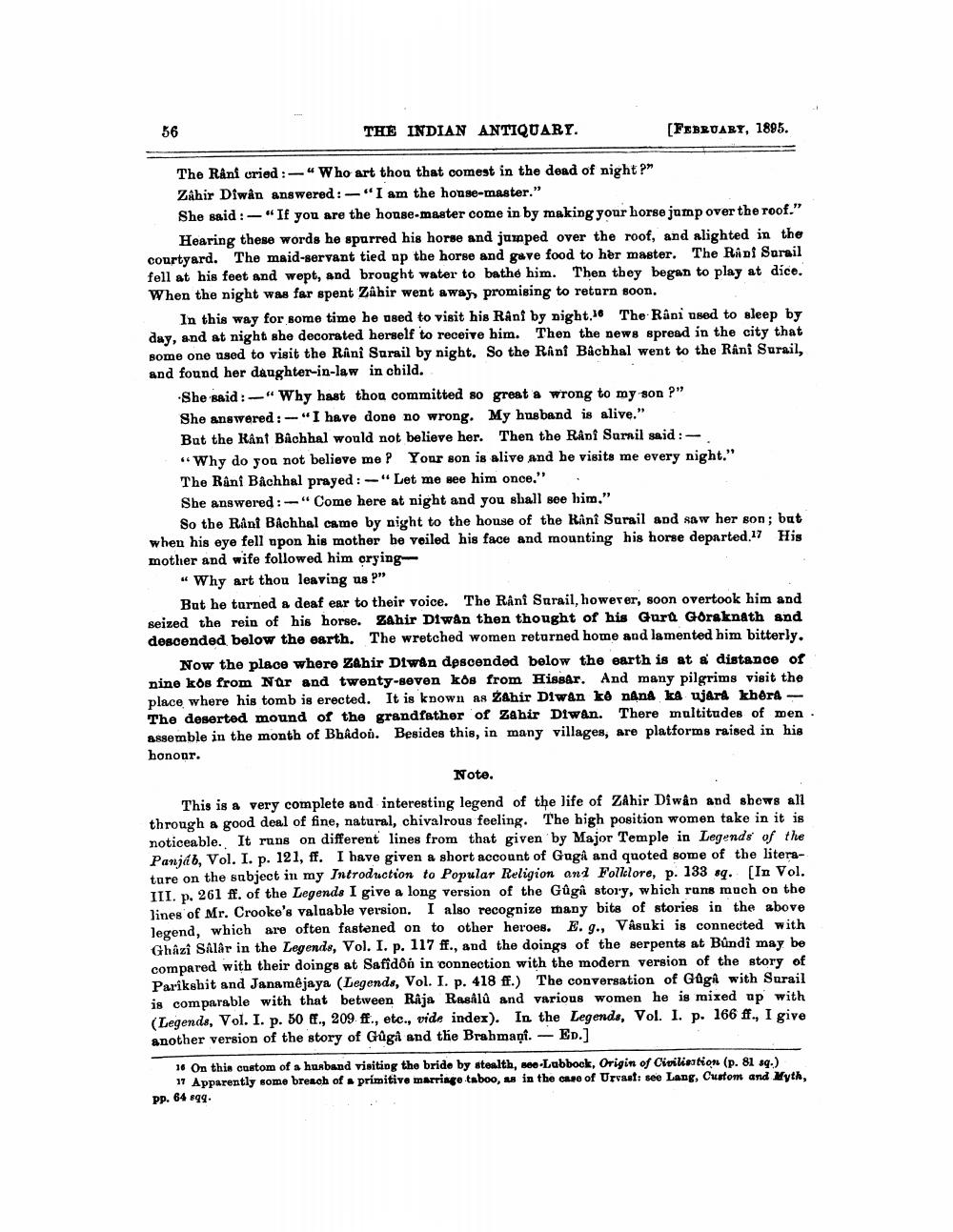________________
56
THE INDIAN ANTIQUARY.
(FEBRUARY, 1895.
The Râni cried :-"Who art thon that comest in the dead of night " Zahir Diwan answered: -"I am the honge-master." She said :-"If you are the house-master come in by making your horse jump over the roof."
Hearing these words he spurred his horse and jumped over the roof, and alighted in the courtyard. The maid-servant tied up the horse and gave food to her master. The Radi Sorail fell at his feet and wept, and brought water to bathe him. Then they began to play at dice. When the night was far spent Zabir went away promising to return soon.
In this way for some time he used to visit his Rani by night.56 The Râpi used to sleep by day, and at night she decorated herself to receive him. Then the news spread in the city that some one used to visit the Rani Sarail by night. So the Rani Bâchhal went to the Rani Surail, and found her daughter-in-law in child.
She said :-" Why hast thon committed so great a wrong to my son ?" She answered: -"I have done no wrong. My husband is alive." Bat the Kant Bichhal would not believe her. Then the Rani Surnil said :“Why do yon not believe me? Your son is alive and he visits me every night." The Rani Bachhal prayed: - "Let me see him once." . She answered: "Come here at night and you shall see him."
So the Rani Bichhal came by night to the house of the Rani Surail and saw her son; but when his eye fell upon his mother be veiled his face and mounting his horse departed.17 His mother and wife followed him crying
"Why art thou leaving us !"
But he turned a deaf ear to their voice. The Râni Sarail, however, soon overtook him and seized the rein of his horse. Zahir Diwan then thought of his Guru Goraknath and descended below the earth. The wretched women returned home and lamented him bitterly.
Now the place where Zahir Diwan descended below the earth is at a distance of nine kos from Nor and twenty-seven kos from Hissar. And many pilgrims visit the place where his tomb is erected. It is known as Zahir Diwan ko nana ka ujard khera - The deserted mound of the grandfather of Zahir Diwan. There multitudes of men. assemble in the month of Bhadon. Besides this, in many villages, are platforms raised in his honour.
Note. This is a very complete and interesting legend of the life of ZAhir Diwan and shews all through a good deal of fine, natural, chivalrous feeling. The high position women take in it is noticeable. It runs on different lines from that given by Major Temple in Legends of the Panjáb, Vol. I. p. 121, ff. I have given a short account of Gugâ and quoted some of the literature on the subject in my Introduction to Popular Religion and Follelore, p. 133 sq. [In Vol. III. p. 261 ff. of the Legends I give a long version of the Gûga story, which runs much on the lines of Mr. Crooke's valuable version. I also recognize many bits of stories in the above legend, which are often fastened on to other heroes. E. g., Vásuki is connected with Gházi Salâr in the Legends, Vol. I. p. 117 ff., and the doings of the serpents at Búndi may be compared with their doings at Safidoo in connection with the modern version of the story of Parikshit and Janamêjaya (Legends, Vol. I. p. 418 ff.) The conversation of Gugl with Sarail is comparable with that between Raja Rasálů and various women he is mixed up with (Legends, Vol. I. p. 50 Ef., 209 f., etc., vide index). In the Legends, Vol. I. p. 166 ff., I give another version of the story of Gúga and the Brahmaņi. - ED.)
16 On thin custom of a husband visiting the bride by stealth, seo-Labbock, Origin of Civilisation (p. 81 sq.)
17 Apparently some breach of primitive marriage taboo, as in the case of Urvast: see Lang, Custom and Myth, Pp. 64 899.




